This past Saturday, over 700 progressives, both veteran organizers and newcomers to progressive activism, gathered at the Lansing Center in Lansing, Michigan for the Michigan Progressive Summit (although except for two brief mentions by Michigan Radio, you’d never know it.) Organized by Progress Michigan, it was a day of inspiring speeches, well-organized breakout sessions, and networking for the progressive community.
The last Michigan Summit was in 2013 and the attendance at this year’s event was nearly double that of previous conferences. It’s a sign that the progressive movement is alive and well and geared up to fight the agenda and policies of the Bannon/Trump presidency as well as that of our own Republican-controlled state legislature and executive branch in the months and years ahead of us.
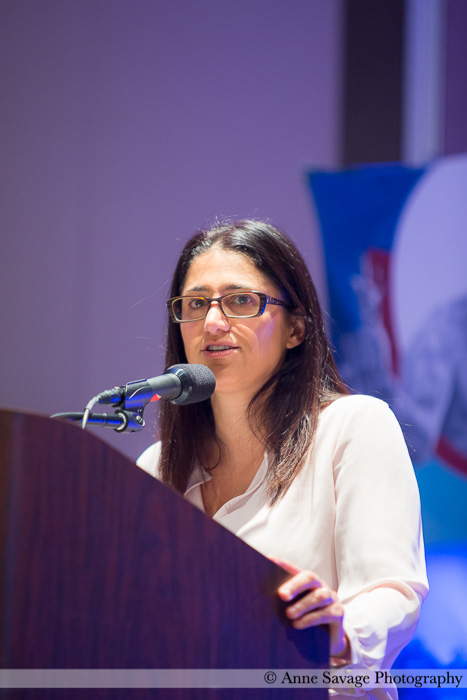
Dr. Mona Hanna-Attisha
The first speaker of the day was Flint pediatrician Dr. Mona Hanna-Attisha. She gave the attendees a brief history of Flint, a city, she said, “Where the American Dream was born.” She explained that, prior to the so-called Flint Water Crisis, the city was already facing higher than normal levels of lead in its residents’ environment. Work was being done to bring those levels down and it was working. Then, after Gov. Rick Snyder’s Emergency Managers switched the city’s drinking water source to the Flint River, the levels started rising again. What happened in Flint, she said, is an environmental injustice and it’s a form of racial injustice.
Dr. Mona, as she is often called, is an immigrant. She was born in Iraq and came here when she was four. “I wasn’t born here and I’ll gladly show you my birth certificate,” she said to laughter. “We were welcomed into the fabric of this society… I’m not sure that would happen today.”
“For my family the American Dream became a reality,” Dr. Monay told the audience. “I repaid that by taking a career in service.”
“There are two Americas,” she explained, “The America I was privileged to grow up in and the America I see everyday in my clinic.”
“This nightmare has to be OUR nightmare,” she told the audience, referring to the Flint Water Crisis. “To truly fix Flint and children everywhere, we need to rebuild the American dream. It’s not just a labor issue or a children’s issue. It’s a public health issue… There are towns like Flint everywhere where children are waking up to a nightmare of poverty every day… The American Dream that was born in Flint needs to be the dream for everyone, not just a select few.”
She said that the Flint story “is a precautionary tale.”
“When you hear Republicans talking about deregulation, I want you to think about Flint,” she said. “We need an active government, a responsive government, a strong governmentto help keep us safe. Government should NOT be run like a business.”
“Our choice to be activists is easy,” she said. “You need to be ready because we are ALL activists. We won’t win every battle but we will fight every fight and we will fight every battle. We are the resistance and we will fight every fight.”
Dr. Mona concluded, saying, “You might not be hearing about Flint as much be we are still here. The children coming into my clinic still cannot drink water from the tap without a filter and we are going into our fourth year. But I also want to remind you that Flint is tough and has courage, and grit and determination.”
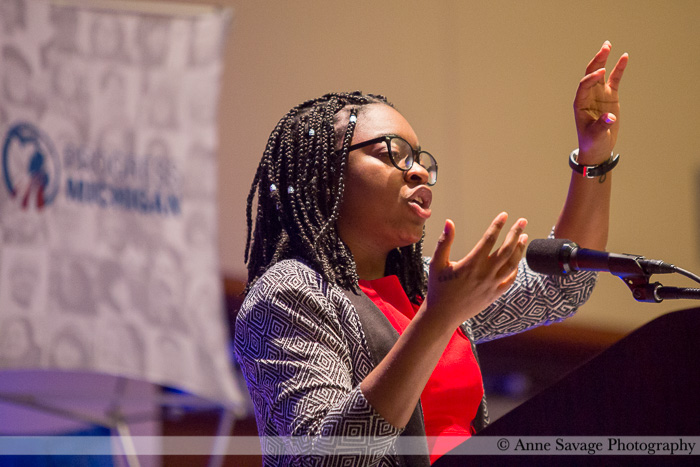
Charlene Carruthers
Dr. Mona was followed by Charlene Carruthers. Carruthers is a 31-year old Black, queer feminist who is the National Director of Black Youth Project 100 (BYP100). During her speech, she acknowledged that some of what she was saying was likely to make people feel uncomfortable. “But, if I’m not making you uncomfortable,” she said, “I’m not doing my job.
Carruthers talked about how to effect sustainable, meaningful change in American society. “I’ve learned we always have to center our fight on structural changes,” she siad. “Band-Aid solutions can work for awhile but when you lift them up later, you may find a scar or you may find the same old wound.”
She pointed out the hypocrisy of those who denigrate Black people who rise up to take action. “While pointing to the pathological Black people, the inherently violent Black people, people forget to mention the closing of over 50 public schools.”
She also reminded progressives that President Bill Clinton’s crime bill didn’t just impact the USA. “It’s been exported,” she said. “The machinery of the prison industrial complex weren’t built by [the Obama] administration. A lot of times when we get together, we seem to develop this sort of collective amnesia.
Her point was that we can’t solve these problems unless we know our history. “We have to be honest,” she told the audience.
She pointed out how comments by Donald Trump during his speech to a joint session of Congress last week, “Connected safety, jobs, and unity to law enforcement. The origins of law enforcement are slave patrols, protecting personal property.”
But, she said, there’s more to resistance than just tearing down what’s in front of us. “Burning shit down” isn’t the only solution, she said. “It’s not just enough to dismantle a system without imagining what’s possible. We need to have something to replace it with.”
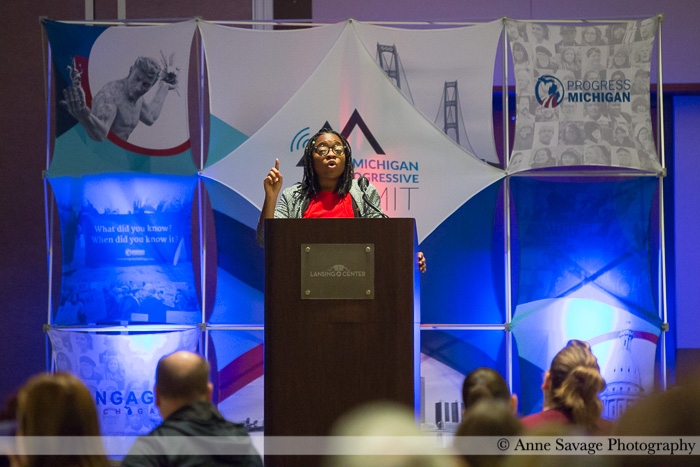
She went on to say that reform is good but it can’t entrench systems that harm us. “We need something more, something big,” she said. She used the example of private prisons: “Being against private prisons is like the progressive cause du jour. But we need to think bigger. Let’s question how we’re dealing with people, not just disposing of them or controlling them in a specific place.
She pointed out that, as progressives, we have to support solutions that work for everybody, even those we consider “the least” in society. If you’re discussing how to solve problems and you’re surrounded by people that look like you, have the same background as you, have the same experiences as you, that’s a problem.
She also pointed out that, if you’re talking about building bridges but don’t talk about power, you guarantee that things will be uneven. “You can’t build a bridge to a group that has an uneven level of power,” she said. When Dr. King talked about building bridges between groups, he didn’t do it without recognizing the cracks in our society and the intentional efforts to create divides.
Carruthers explained that one of the things Detroit-based activist and organizer Grace Lee Boggs talked about when she talked about revolution and working with others who worked for revolution was the importance of a revolution within ourselves. “The movement will transform you if you are doing it right,” Carruthers said. Where Dr. King and Malcolm X and other movement leaders were when they were killed “was not where they were when they started.” We must do the same. And through organizing people and changing culture, she said, “We must always work to make better leaders than ourselves.”
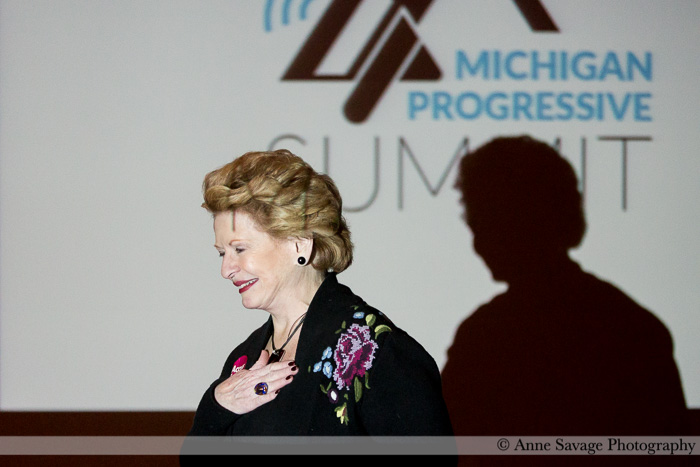
U.S. Senator Debbie Stabenow
Senator Debbie Stabenow also addressed the attendees of the conference. She encouraged people to keep stepping up, to keep calling their elected officials, and to keep being heard. “Every time our voice mail crashes, I smile,” she said. “Because I know that people are waking up.”
Sen. Stabenow encouraged people to speak out on the cuts to the Great Lakes clean up fund she helped create in partnership with the Obama administration.
She also talked about how Democrats are working to resist the Bannon/Trump administation. For example, they intentionally slowed down confirmations of his cabinet picks in order to allow people to organize and speak out. When the Republicans wouldn’t allow regular people to testify at confirmation hearings, they held shadow hearings to give them a voice. It didn’t work everywhere but it did in some instances.
She exhorted the gathered progressives to keep the pressure on with respect to the Affordable Care Act and especially with respect to funding Planned Parenthood and protecting Medicaid. “97% of the children in the USA have healthcare because of what we did with the ACA,” she said.
She concluded by urging people to get involved at every level, even at the local level.
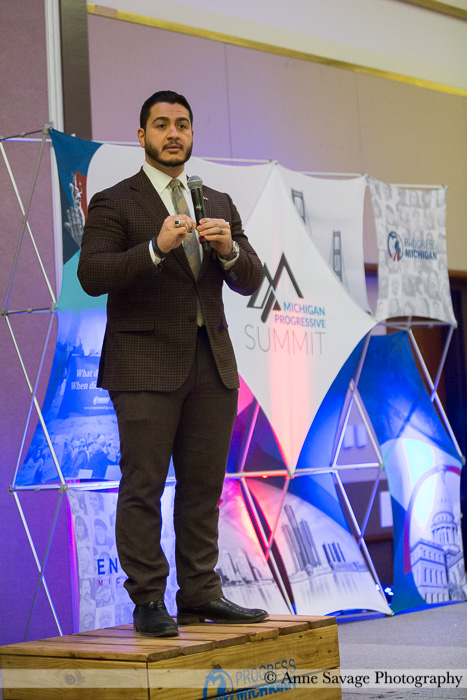
Dr. Abdul El-Sayed
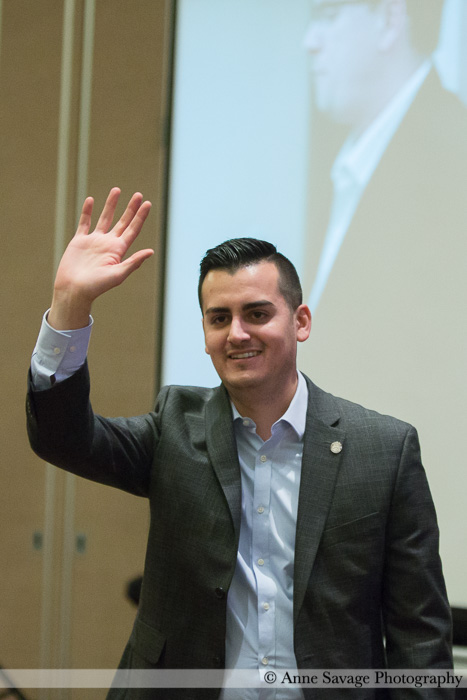
Michigan Representative Darrin Camilleri
In addition to “Progressive Soapbox” talks given by gubernatorial candidate Dr. Abdul El-Sayed and financial entrepreneur Joe Sanburg who co-founded the online financial services company Asprirations, the last major speaker of the day was Emily’s List President Stephanie Schriock. She gave a very inspiring speech about their efforts to get more women into elected office.
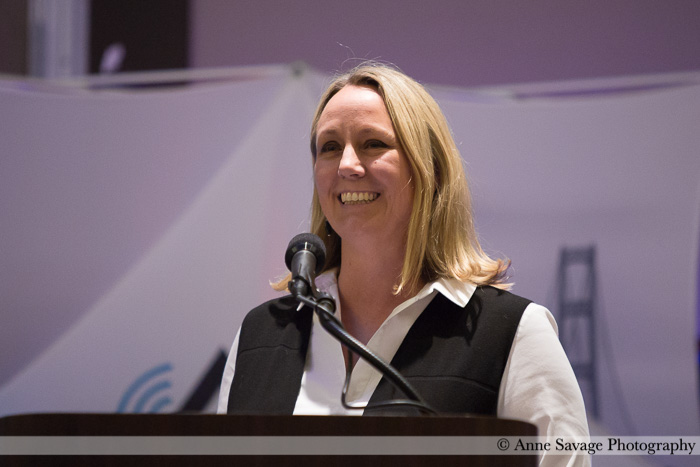
Stephanie Schriock
She gave examples of some of their successes including the fact that there are now four new women U.S. Senators, three of whom are people of color. This is a huge accomplishment given that the most we’ve ever had in the Senate before was two.
People get tripped up by thinking they need to have a “perfect resume” and broad skill sets, she told the gathering. You can learn how to talk to the press and how to do public speaking and other skills, she said. These can be taught. What we actually need is broader diversity and backgrounds and candidates who have a series of specific values: Integrity, passion, energy, commitment, likes people, willingness to learn, willingness to ask for help, and skin that can thicken.
By the time she was finished, it was clear that a number of women in the room were ready to get involved and either run for office themselves or work to help other women get elected.

Progress Michigan Communications Director Hugh Madden
In addition to the speakers, there were breakout sessions throughout the day to allow folks to discuss specific issues. These included the following topics:
- Islamophobia: A Threat to All
- Achieving 100% Renewable Energy
- Organizing in Economically and Racially Isolated Communities
- How We Repair Michigan’s Broken Election System
- No News is Bad News: A Dummies Guide to Organizing a Press Conference
- Making Your Voice Heard: Civic Engagement with the Legislature
- MI Budget & You
- Getting ready to Run
- Intentionality in the Movement: Recognizing and Combatting Oppression at Every Corner
- The Corporate Take Over of Your Public School: Understanding the History and Future
- Cutting Edge Civil Liberties Issues in Michigan: With the ACLU of Michigan
- Introduction to Transparency and Accountability in Government
- Voices for Women’s Health
- Skills for Resisting the Corporate Take Over of Your Public School
- Economic Justice in Michigan
- An Organizers Toolbox
- Digital Tools Training
- Backyard Civics 101
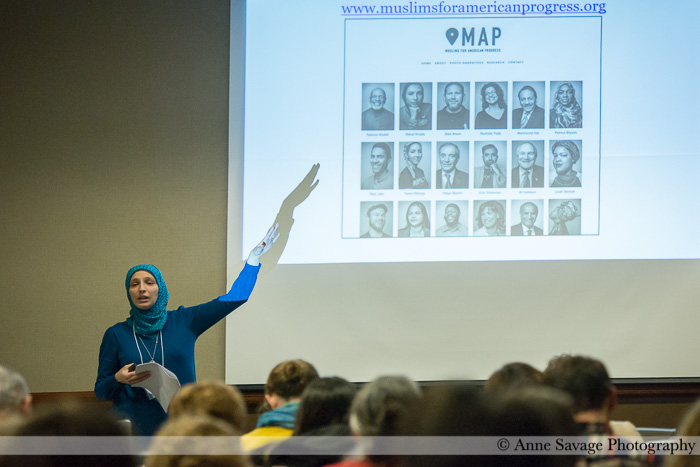

Late in the day regional caucus breakout sessions were held. The regions were composed of clustered counties and gave activists from these regions time to get to know one another and begin the process of networking to build coalitions among like-minded people from their areas. One thing that was abundantly clear from the regional caucus I attended is that there are large numbers of groups, many that have only formed in the past few months, and there is, as of this moment, no central way for them to interact with each other, coordinate events and activities, and to share best practices. In time and thanks to events like the Michigan Progressive Summit, that is very likely to change. And, if the energy and passion behind this new organizing and activism can be harnessed into a sustainable grassroots organizing, it could be a game-changer both here in Michigan and across the country.
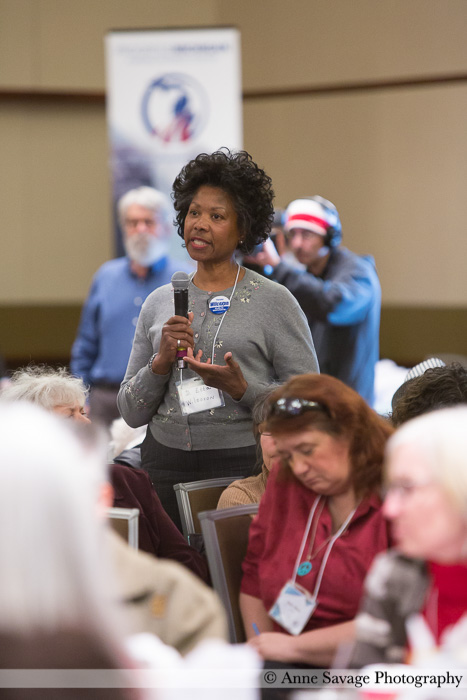 The event concluded with a panel discussion featuring moderated by Detroit Free Press columnist Nancy Kaffer titled “Journalism in Trump’s America” featuring Rebecca Buckwalter-Poza from the Center for American Progress and political columnist Michael Cohen from The Boston Globe. It was an eye-opening glimpse into what American journalists face with the Bannon/Trump administration in power. It made it clear to everyone who watched, listened, and asked questions that our news organizations are more important today than ever before and that we need to support them for the sake of our American democracy.
The event concluded with a panel discussion featuring moderated by Detroit Free Press columnist Nancy Kaffer titled “Journalism in Trump’s America” featuring Rebecca Buckwalter-Poza from the Center for American Progress and political columnist Michael Cohen from The Boston Globe. It was an eye-opening glimpse into what American journalists face with the Bannon/Trump administration in power. It made it clear to everyone who watched, listened, and asked questions that our news organizations are more important today than ever before and that we need to support them for the sake of our American democracy.
Kudos to Progress Michigan who organized this incredible and important event (with a special shout-out to New Media Specialist Marissa Luna who, as I understand, took a particularly large leadership role.) This is what we as progressives need to be doing on an ongoing basis to ensure that the new level of grassroots activism that we’re seeing all across the country is able to make substantial change. And in Michigan more than anywhere else, we NEED that change and we need it soon.



